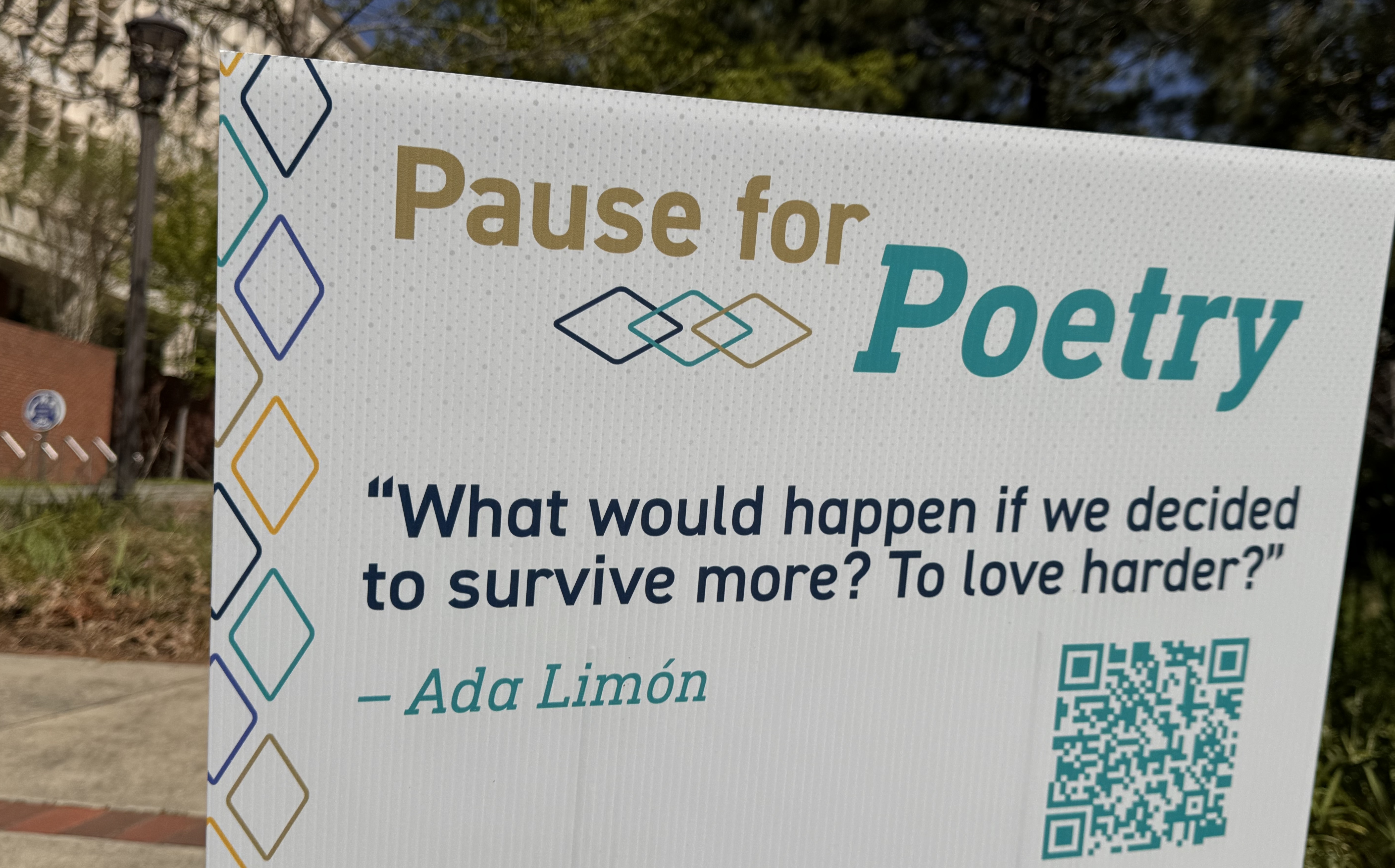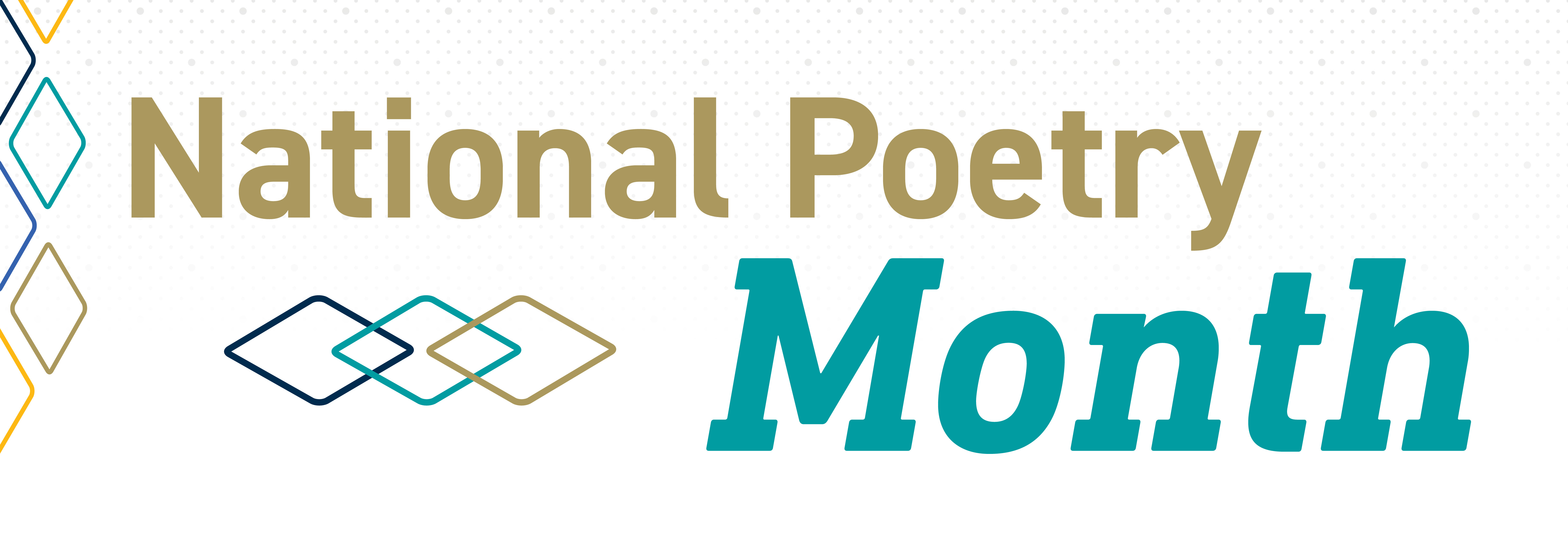
Poetry is a mysterious craft. Creating a poem is rigorous and demanding, and reading poetry can be a bit like solving a puzzle. According to Poetry@Tech’s Victoria Chang and Travis Denton, these are challenges worthy of every Georgia Tech student.
“No one listens to just one song and says, ‘Music isn’t for me.’ We should take the same approach to poetry. There are poems for everyone,” said Chang. She is an acclaimed poet, the Georgia Tech Bourne Chair in Poetry, and the director of Poetry@Tech.
Founded in 2001 under acclaimed poet Thomas Lux, Poetry@Tech has brought poetry to Atlanta with dozens of readings, classes, and other outreach efforts over the years.
For Chang and Poetry@Tech Associate Director Travis Denton, instilling a deep appreciation for poetry in Georgia Tech students is all in a day’s work, as many students will attest.
Aaron Bartleson, a fourth-year physics student, is finishing his first poetry class this semester.
“I think it’s easy for people who are studying the natural sciences to think that their chosen area can describe everything about reality,” says Bartleson. “Poetry teaches me that’s simply not the case.”
“Poetry@Tech has shown me the power of words and the value of self-expression,” said Taahir Christie, a student in Denton’s LMC 3234 Creative Writing course. “Before I found poetry, I was lost, and I did not know why. I felt like something was missing. In the end, I found that poetry was the missing piece of my soul. I am not fully myself without it. Poetry has given me a new way to understand myself and the world better.”
In the spirit of National Poetry Month, we asked Chang and Denton to share a few thoughts and insights on reading and appreciating poetry.
Reading Poetry 101: Start With ‘Hospitable’ Poems
“In our language, poetry is the measure of all things,” says Denton. “Announcers describe Olympians and athletes as ‘poetry in motion.’ When you finish a great story and tears are welling up as you turn the last page, you say ‘that was sheer poetry.’”
But for those who might have had less than satisfying encounters with poetry in the past, Denton says not to give up.
“Poetry is a lot like music — you have to find your jam,” he says. “If you pick up a poem and you don’t like it, chances are good that just isn’t your kind of poetry.”
Denton says his approach to bringing students and poetry together begins with selecting the right poems. (For a curated list, see the sidebar.)
“Poet Billy Collins says that some poems are ‘hospitable’ toward the reader, meaning you don’t need a set of encyclopedias to understand them,” he says. “They invite the reader in. C.K. Williams’ “The World’s Greatest Tricycle Rider” is one I often use to begin my semester of my Creative Writing/Poetry class.”
Chang and Denton agree that less hospitable poems can be roadblocks for new readers, but they encourage their students to approach them like a puzzle.
“What I love about poetry is that nothing is what it seems,” says Chang. “You pick up on new things every time you reread a poem. It’s a fun challenge, and it should be fun.”
Reading Poetry: Perspectives and Tips
Denton says sometimes people new to poetry feel they have to “interrogate” a poem for its meaning. Instead, he and Chang suggest embracing the unknown.
“A poem is in some ways like a person; there will always be some mystery to it,” says Chang. “If you go into a poem seeking to understand every single thing about it, you might not be fulfilled or satisfied at the end.”
If a poem’s meaning seems impenetrable, Chang and Denton suggest reconsidering your approach.
“Sometimes readers try to apply the same lens they use to read a novel or watch a film — looking for narrative and a linear kind of understanding,” Chang says. “Poetry is understood through a different kind of perspective, more like looking at a collage or listening to a piece of music.”
“I tell my students to read first just for pleasure, for the sound, rhythm, and the music of the poem,” says Denton. “Poet Wallace Stevens said readers should focus first on how a poem makes them feel, rather than searching right away for meaning.”
“And feeling has meaning too,” adds Chang.
Finally, Denton says many who are reading poetry aloud for the first time feel they should pause at the end of each line. Instead, he suggests timing pauses according to punctuation.
“I think pausing at the end of each line can disjoint the narrative,” says Denton. “You’ll see the end of the line come, but if there’s not a period, keep going.”

National Poetry Month Happenings
April is National Poetry Month, and Poetry@Tech has been celebrating across Georgia Tech’s campus with workshops and events, yard signs, a video series, an exhibition on the Library’s media bridge, and more.
The celebration rounds out on Thursday, April 18, first with a poetry performance workshop from 11 a.m. to 12:30 p.m. in the lobby of the Ferst Center for the Arts.
Then, that evening starting at 6 p.m., all are welcome to attend a reception and the National Poetry Month Poetry Reading in the John Lewis Student Center Cypress Theater. The event is free and open to the public.
Poetry Reading and Listening Recommendations
“Oranges” by Gary Soto
“My Brother at 3am” by Natalie Diaz
“How to Triumph Like a Girl” by Ada Limón
“A Small Needful Fact” by Ross Gay
Podcast: Victoria Chang on “The Leaving,” by Brigit Peegen Kelly
On Crafting Poetry
Acclaimed poet Thomas Lux, who was the founding director of Poetry@Tech, described what it takes to craft poetry in the program’s 2002 mission statement:
Good poems are the result of planning, rigor, attention, intuition, trial and error, discipline, and the luck that sometimes comes when all of the above are applied … To achieve his or her goals, that precision, that truth, the engineer, the chemist, the architect, the poet usually must work diligently, must sweat blood.
For many Georgia Tech students, this is a new kind of challenge — and one they find deeply rewarding.
“Poetry is the sword that slays my inner demons,” says student Taahir Christie. “It is the gateway to a place of healing.”
Chang says many students find solace — and an endlessly satisfying pursuit — in poetry’s “economy of language.”
“It’s pretty incredible that we have only 26 letters, and poets continuously combine them in interesting and fresh new ways,” she says. “A poem is a manifestation of our human condition, which is both oddly clear and mysterious at the same time.”
